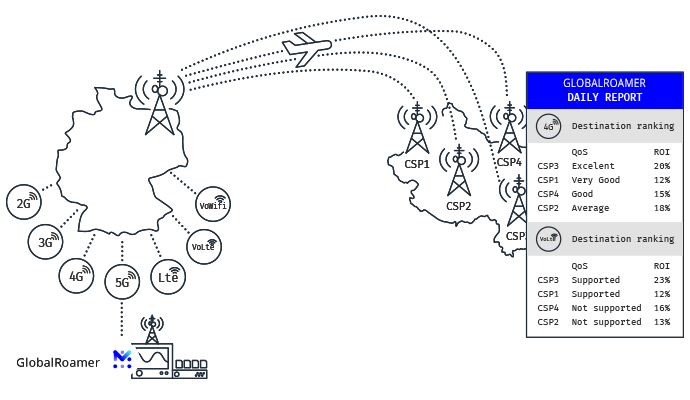
E2E active testing to ensure IMS quality across traditional and value-added offerings
IMS Testing
IP Multimedia Subsyste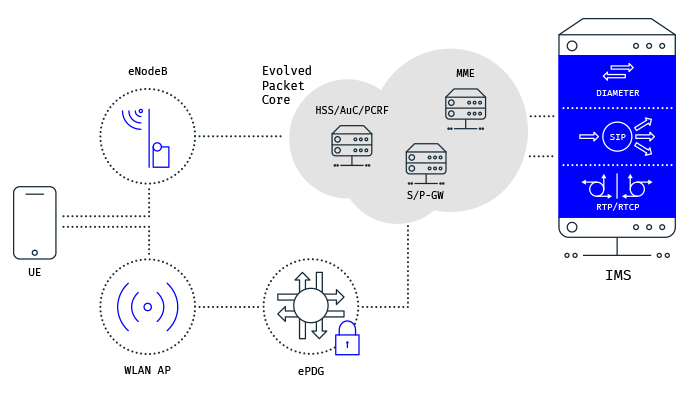 m (IMS) is a key enabler for various services in today’s mobile networks, for traditional services such as voice in data-only and packet-based networks, and for new value-added services, designed to enhance the value proposition of mobile operators.
m (IMS) is a key enabler for various services in today’s mobile networks, for traditional services such as voice in data-only and packet-based networks, and for new value-added services, designed to enhance the value proposition of mobile operators.
Mobileum offers a comprehensive set of tools that operators can use to test and periodically monitor their IMS services, in all stages of deployment, from lab to live operation. The suite of test cases covers all scenarios required to validate the IMS service and the interworking with other technologies. With full control of the IMS client (for wireless modules and S1 based tests) in-depth KPIs are provided, including SIP and RTP KPIs and the respective result files, e.g. PCAP traces, audio/video references, L3 Traces.
IMS Testing Use Cases
Due to the increase in over-the-top (OTT) applications, traditional voice services and revenues are declining. Furthermore, as the number of 2G and 3G networks decrease, IP Multimedia Services (IMS) have become an important solution for MNOs, as it allows them to diversify offerings, implement new pricing models, and partner or compete with OTT players. However, because of the complexity and interoperability with legacy technologies, IMS presents operators with new challenges, especially in roaming, when two networks and interconnecting parties are involved.
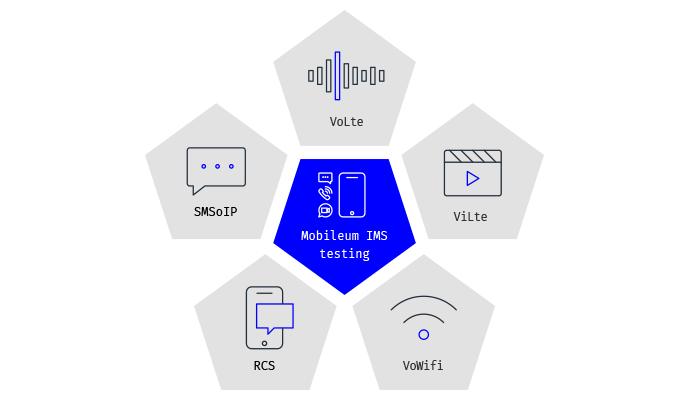
Mobileum’s IMS testing solution allows stack adaptation and automated periodic testing of the following use cases:
❖ VoLTE testing via wireless modules, smartphones, or core network probes
❖ ViLTE testing on wireless modules
❖ VoWiFi testing via untrusted non-3GPP access, EAP-AKA authentication
❖ RCS testing using Mobileum’s RCSe client
❖ SMSoIP testing via wireless modules or core network probes
Mobileum’s IMS Testing Approaches
Typical IMS services require communication and coordination between several network nodes, in different areas of the operator’s network, RAN, EPC and IMS. Furthermore, the end-to-end service is established and delivered using different protocols, e.g SIP, RTP, HTTP, MSRP all running on top of IP.
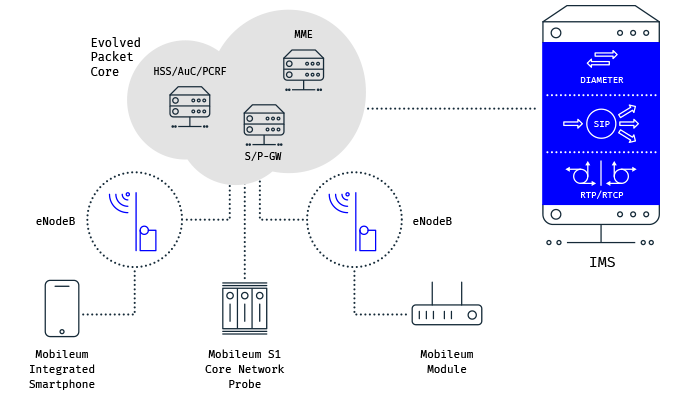
Mobileum offers a comprehensive set of tools that operators can use to test and periodically monitor their IMS services, in all stage of deployment, from lab to live operation. The flexibility of the system allows different testing approaches:
❖ LTE Wireless Interfaces and Mobileum's robust IMS client
❖ Core Network using S1 Core Network Probes and Mobileum IMS client for high volume testing, eliminating radio specific issues
❖ Real Devices using the native IMS client of the smartphone for QoE testing on commercial smartphones
The Mobileum IMS client
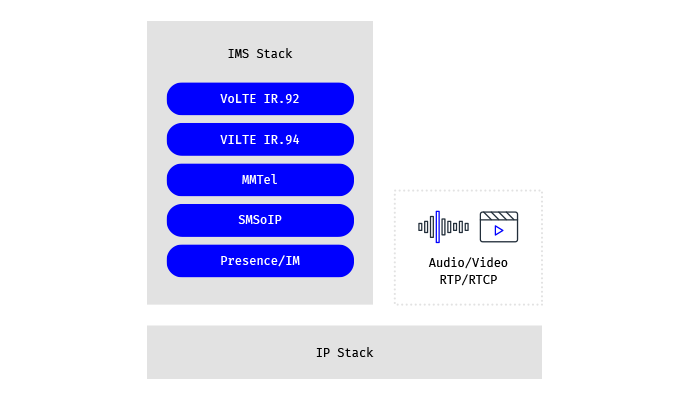 The Mobileum IMS Client performs end-to-end testing of IMS Services with full control over all layers of the IMS Stack and produces detailed KPIs down to the protocol level. The client can run over wireless modules (LTE Uu) or core network probes (S1) and test a wide range of IMS Services, e.g. VoLTE, ViLTE, VoWiFi, SMSoIP, RCS. It was developed according to GSMA IR.92, IR.94 profiles for Voice, SMS, and Video over LTE, IR.51 profile for Voice and SMS over WiFi and RCS Universal Profile, and the respective 3GPP standards.
The Mobileum IMS Client performs end-to-end testing of IMS Services with full control over all layers of the IMS Stack and produces detailed KPIs down to the protocol level. The client can run over wireless modules (LTE Uu) or core network probes (S1) and test a wide range of IMS Services, e.g. VoLTE, ViLTE, VoWiFi, SMSoIP, RCS. It was developed according to GSMA IR.92, IR.94 profiles for Voice, SMS, and Video over LTE, IR.51 profile for Voice and SMS over WiFi and RCS Universal Profile, and the respective 3GPP standards.
Other features of the Mobileum IMS Client include:
❖ Support for: P-CSCF discovery, IPv4, IPv6 or dual-stack IPv4v6, GBR/MBR dedicated bearers, and SIP over TCP or UDP
❖ Authentication over AKAv1-MD5, AKAv2-MD5 (or MD5) with IPSec support (3GPP TS 24.229, 3GPP TS 33.203)
❖ Support for alphanumeric, MSISDN and TEL URI addressing, and for media session negation over SIP-SDP
Voice over LTE (VoLTE) testing
VoLTE is an essential service for mobile operators, that enables voice support in LTE networks. It is fundamentally different and more complex, compared to traditional CS voice.
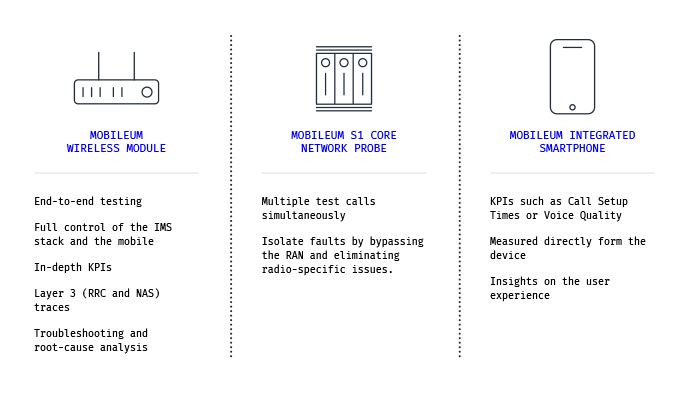 Mobileum’s VoLTE testing uses these approaches:
Mobileum’s VoLTE testing uses these approaches:
❖ Wireless Modules (LTE Uu) for end-to-end testing, with full control of the IMS stack and the mobile, providing in-depth KPIs, Layer 3 (RRC and NAS) traces and various result files for troubleshooting and root-cause analysis.
❖ Core Network Interfaces (S1) to execute multiple test calls simultaneously and isolate faults by bypassing the RAN and eliminating radio-specific issues. In combination with LTE Uu interface using Wireless Modules, the operator can observe service QoS from two perspectives.
❖ On smartphones providing KPIs such as Call Setup Times or Voice Quality, measured directly form the device for insights on the user experience.
Are you getting the VoLTE customer experience and revenue you expected?
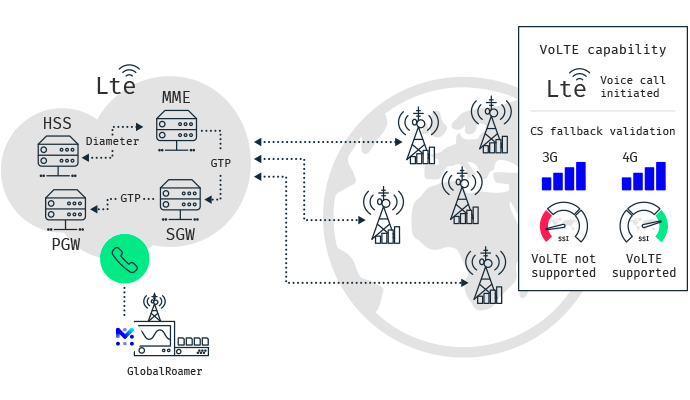
CSP’s are beginning to shut down 3G networks, with many now using LTE networks exclusively. This means voice calls are now using VoLTE, and the existing charging and revenue paradigm will have to change. VoLTE calls are not charged simply according to the time of call; instead, the call will be a data session that will consume a data bucket. Using Mobileum Test Factory, service providers can validate the roaming behavior of its customers on VoLTE networks so that business models can be confirmed or adapted as needed. Also, based on the roaming customer experience, service providers can determine the best suitable roaming agreements to provide a reliable VoLTE connection that meets the service provider standards.
VoLTE Test Cases
Mobileum’s wide range of VoLTE test cases cover all necessary scenarios for validating VoLTE services from an end-to-end perspective: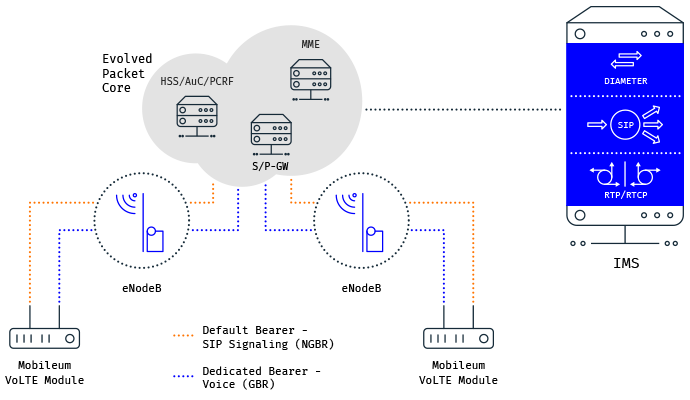
❖ Basic VoLTE – a set of test cases that can be used to check VoLTE call establishment, between two VoLTE subscribers or between a VoLTE subscriber and a 2G/3G/PSTN subscriber.
❖ VoLTE with Voice Quality – call establishment with additional voice quality measurements using the POLQA algorithm and multi-transmissions test cases to test the consistency of the MOS values, over the duration of the session.
❖ LTE Supplementary Services testing as defined in GSMA IR.92, e.g. Call Forwarding, Call Hold, Call Barring, Conference Call, Message Waiting Indication, and Voice Mail.
All VoLTE test cases can configure the testing scenario, e.g. IMS account and user password, P-CSCF address, URI type. Alternatively, the test cases support auto-configuration based on information stored in the USIM or ISIM.
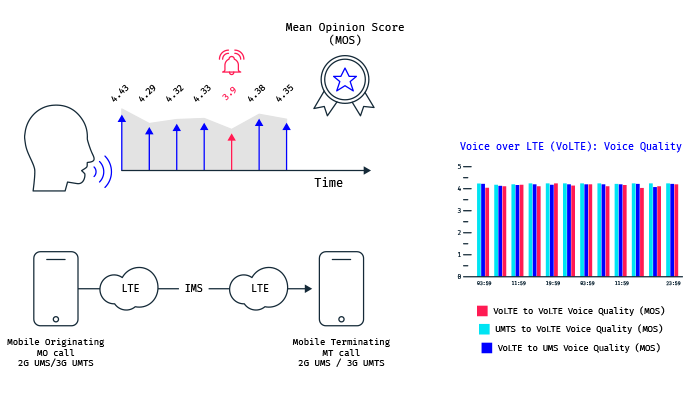 To continuously test and monitor the availability and performance for VoLTE Services, and the interoperability with circuit switch voice, Mobileum recommends a minimum test setup that covers the following:
To continuously test and monitor the availability and performance for VoLTE Services, and the interoperability with circuit switch voice, Mobileum recommends a minimum test setup that covers the following:As the number of 2G and 3G networks decrease, IP Multimedia Services (IMS) come as the enabler for Voice over LTE (VoLTE), RCS, VoWiFi, and SMSoIP. It is a key solution for MNOs that allows operators to diversify offerings, implement new pricing models, and partner or compete with OTT players. Mobileum offers solutions to tackle the complexity and interoperability issues associated with legacy technologies, especially in roaming, when two networks and interconnecting parties are involved.
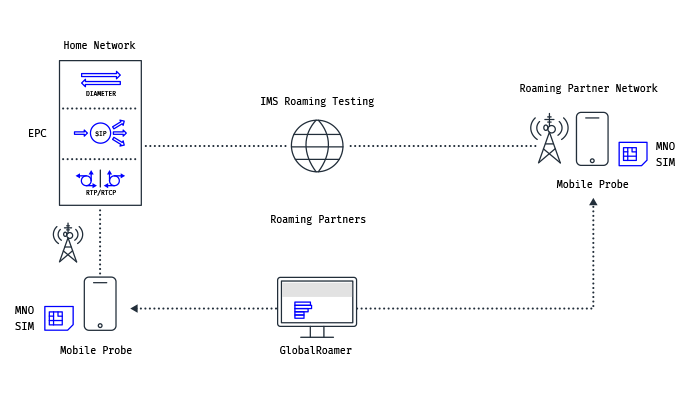
Mobileum’s VoLTE roaming testing solution guarantees your VoLTE subscribers the same supplementary voice services as they expect in traditional 2G/3G networks, e.g. call waiting, call hold etc. It allows stack adaptation and automated periodic testing to ensure QoS & QoE by monitoring performance issues real-time. Our testing scenarios verify:
❖ VoLTE/RCS/SMSoIP basic access
❖ Voice quality with VoLTE
❖ SMS and RCS performance
❖ SSoIMS functionality
Reporting, monitoring, and troubleshooting using essential VoLTE KPIs
Mobileum’s Reporting Engine provides several options for visualizing VoLTE KPIs that cover service availability (success rates), call establishment durations, and voice quality measurements. All test VoLTE cases provide a set of KPIs, which include:
❖ IMS Registration Duration
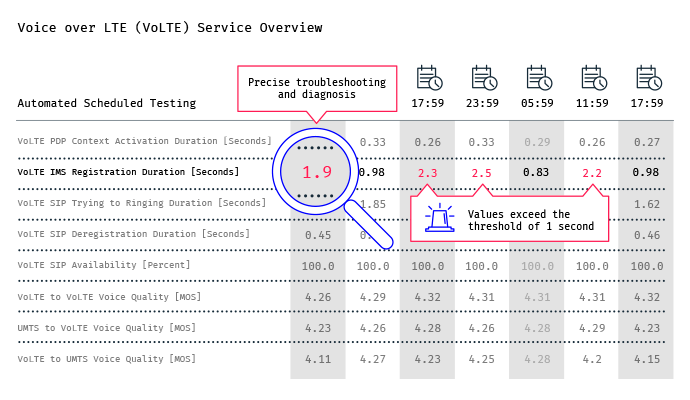
❖ PCSCF discovery/used address
❖ No. of Registration Requests
❖ QCI (default and dedicated bearers)
❖ SIP KPIs: Invite duration, Trying to Ring duration, end-to-end session establishment duration, session duration❖ RTP KPIs: Jitter (Avg, Max), Data Rate, Packet Loss, no. of packets dropped
❖ Voice Quality (POLQA)
❖ Offered/used codecs
❖ L3 KPIs: EPS bearer activation duration, QCI (default, dedicated bearer), AMBR for used APN, GBR/MBR (default, dedicated bearer)
Video over LTE (ViLTE) Testing
ViLTE leverages the operators’ IMS infrastructure to offer conversational video services over LTE.
Mobileum’s ViLTE testing follows the GSMA IR.94 guidelines supporting dedicated bearers for video and audio streams with supported codecs: H.264 (CBP Level 1.2) for video and AMR-WB for audio. It allows operators to periodically monitors video services with important KPIS: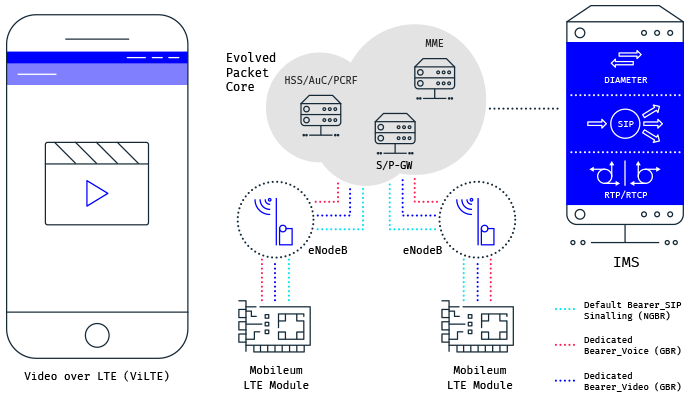
❖ Voice/Video quality provided with POLQA and PEVQ
❖ GBR/NGBR bearer for video
❖ SIP related KPIs, e.g. call establishment duration, trying to ring duration
❖ RTP related KPIs, e.g. RTP packet loss, RTP jitter, RTP data rate
❖ Audio/Video codec used
❖ Audio/Video MOS
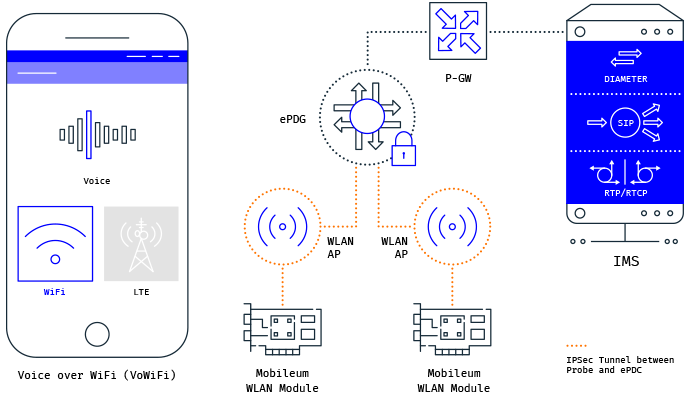 VoWiFi is one of the latest IMS-based services to be launched by mobile operators. It allows users to make voice calls using the data connection from any WiFi access point (untrusted non-3GPP access). The access technology, which is not controlled by the operator, adds another layer of complexity in providing adequate quality of service. Mobileum's VoWiFi testing solution allows operator to verify and periodically monitor the quality of the service. Our approach uses wireless modules as a flexible and robust solution for end-to-end VoWiFi measurements. It allows untrusted non-3GPP access and supports standard methods for WLAN authentication, e.g. WPA2 PSK. It uses EAP-AKA authentication for the IPSec tunnel between UE and ePDG.
VoWiFi is one of the latest IMS-based services to be launched by mobile operators. It allows users to make voice calls using the data connection from any WiFi access point (untrusted non-3GPP access). The access technology, which is not controlled by the operator, adds another layer of complexity in providing adequate quality of service. Mobileum's VoWiFi testing solution allows operator to verify and periodically monitor the quality of the service. Our approach uses wireless modules as a flexible and robust solution for end-to-end VoWiFi measurements. It allows untrusted non-3GPP access and supports standard methods for WLAN authentication, e.g. WPA2 PSK. It uses EAP-AKA authentication for the IPSec tunnel between UE and ePDG.Like VoLTE, the transition to LTE meant that a new mechanism for delivering SMS was required. SMS over IP (SMSoIP) allows users to send or receive traditional SMS messages, while connected to LTE. 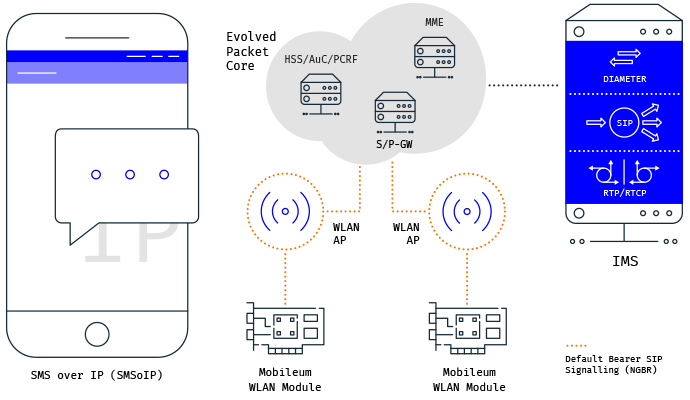
As with VoLTE, Mobileum offers solution for testing and monitoring SMSoIP. Tests scenarios include MO_MT, to/from 2G/3G, and to/from External services, and use two approaches:
❖ SMSoIP testing on LTE wireless modules, a flexible and robust solution for end-to-end SMS over IP measurements, allowing full control of the IMS stack and associated messages.
❖ SMSoIP testing on S1 Core NW interface, an alternative approach for high volume testing that eliminates the radio access leg to isolate faults and provides in depth analysis using detailed traces.
SMS over WiFi (SMSoWiFi) Testing
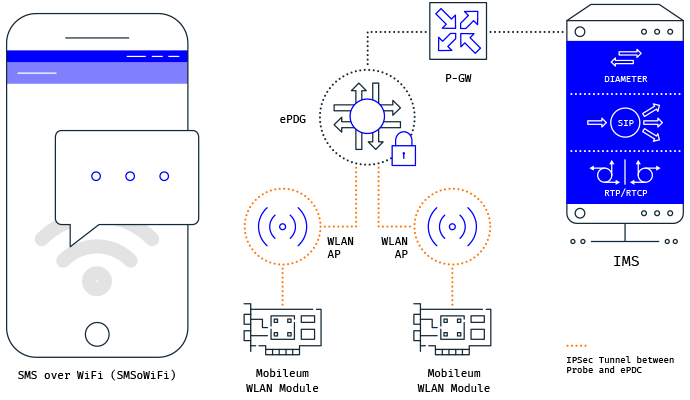 SMS remains an important service for mobile operators, despite stiff competition from OTT messaging. With the introduction of VoWiFi, operators included support for SMS messages over WLAN access. SMS over WiFi (SMSoWiFi) allows users to send or receive traditional SMS messages, while connected to a WLAN access point.
SMS remains an important service for mobile operators, despite stiff competition from OTT messaging. With the introduction of VoWiFi, operators included support for SMS messages over WLAN access. SMS over WiFi (SMSoWiFi) allows users to send or receive traditional SMS messages, while connected to a WLAN access point.
Mobileum’s SMSoWiFi testing is a complete solution to monitor SMS over WLAN modules and offers several options to test different scenarios:
❖ SMSoWiFi_MO_MT
❖ SMSoWiFi to/from 2G/3G
❖ SMSoWiFi to/from SMSoIP (VoLTE)
Rich Communication Suite (RCSe) Testing
RCSe is a platform that offer various services, e.g. instant messaging, using the IMS infrastructure. It enables operators to compete with similar OTT services ensuring a high level of quality. 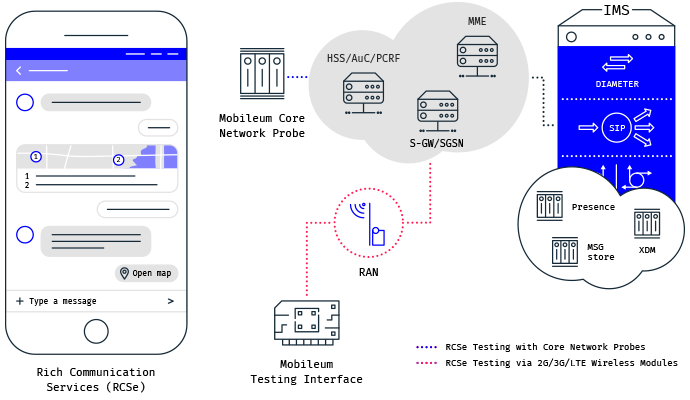
Mobileum’s RCSe testing uses data capable modules and Mobileum RCS v.5.1 client. It can test the following features: Auto configuration, capability discovery, file transfer, IM and video share. The client is capable of auto configuration via Ut interface and IMS registration. Furthermore, root cause and troubleshooting of the RCS-e infrastructure can be observed via the protocol dialogues (SIP, HTTP(S), XCAP, MSRP) that are available as a.pcap result file in each test case iteration.
We offer RCSe core testing for:
❖ QoE, with Joyn App testing on a real smartphone (Samsung Galaxy)
❖ QoS, with Mobileum RCS-e client on a robust wireless module
Monetize the Investments in Telecom Network Infrastructure
Building a reliable network that can support all of the new services demanded by today’s subscribers can be challenging without the right tools. Mobileum’s Test Factory ensures that the quality of service (QoS) between service delivery and customer expectations is always in alignment. Whether it’s caring for VIP customers addressing fault management, or reducing the costs associated with customer care, CSPs are empowered to address concerns proactively. With Test Factory, CSPs can run continuous voice, data, and SMS roaming tests over any technology - 2G/3G/4G/VoLTE/SIP/GTP - to safeguard QoS and ROI.
